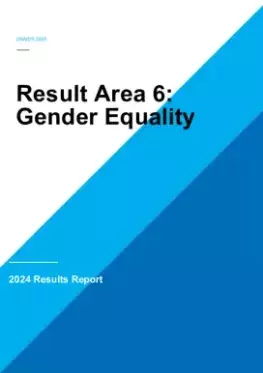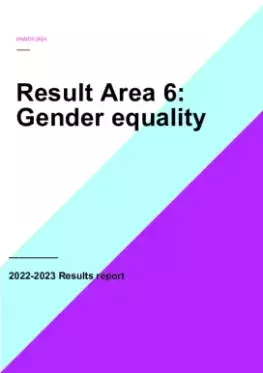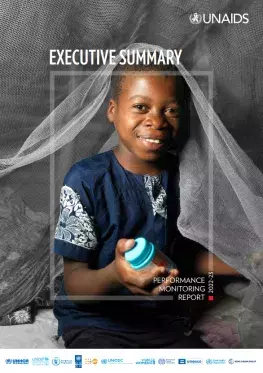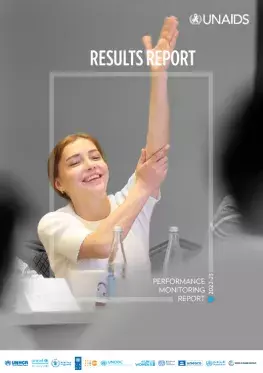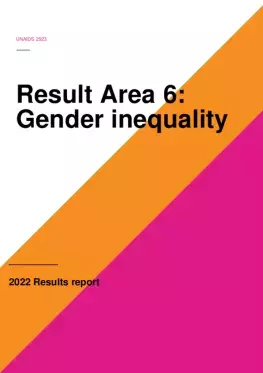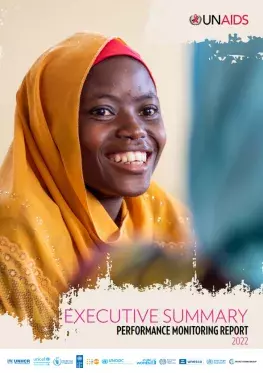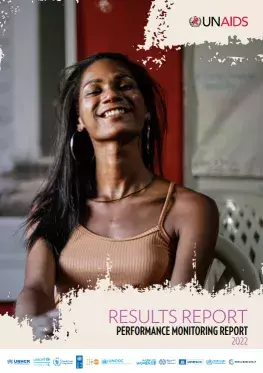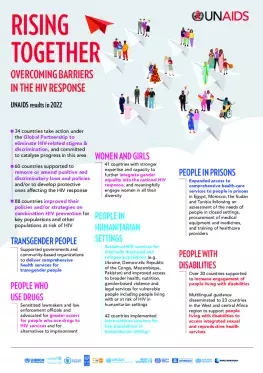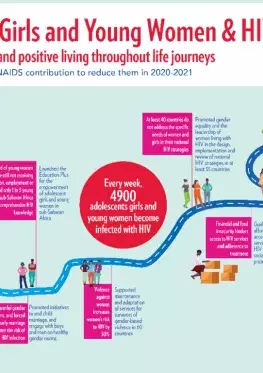Gender inequality is a key driver of the AIDS epidemic. Unequal power dynamics between men and women and harmful gender norms increase the HIV vulnerability of women and girls deprive them of voice and the ability to make decisions regarding their lives, reduce their ability to access services that meet their needs, increase their risks of violence or other harms, and hamper their ability to mitigate the impact of AIDS. Although decreasing, the incidence of HIV among adolescent girls and young women remains extraordinarily high in parts of sub-Saharan Africa. Gender inequalities also hamper key populations’ access to HIV services. Across much of the world, boys and men living with HIV are less likely than their female counterparts to know their HIV status and receive HIV treatment.
Gender Equality
The Joint Programme continued to advocate for and supported the adoption and implementation of global commitments, evidence-informed norms and standards on gender equality and women’s empowerment, including on gender-based violence in the context of HIV. For example, the Commission on the Status of Women unanimously reaffirmed its resolution on Women, the Girl Child and HIV to address the social and structural drivers of HIV. In 2024, the Joint Programme strengthened the gender expertise and capacities of 50 countries to further integrate gender equality into the national HIV response and meaningfully engage women together with men. Moreover, in 44 countries, the Joint Programme provided policy and advocacy support and contributed to mobilizing partnerships to implement gender-responsive HIV prevention, treatment, care and support services free of gender-based discrimination and violence.
Gender assessments supported by the Joint Programme summarized evidence on gender-related barriers in the HIV response and helped improve national HIV strategies or plans and Global Fund grants funding HIV services. For example, In Armenia, 40% of the 2022 gender assessment recommendations were implemented or included in the Global Fund Grant Cycle 7. In addition, gender assessments conducted in 12 countries with UN Women’s support helped identify structural inequalities, legal gaps and service delivery challenges affecting women living with and affected by HIV.
Linking the International Day for the Elimination of Violence against Women 2024 campaign with the theme “UNiTE to end violence against women and girls: Towards Beijing +30”, the Joint Programme reaffirmed its collaboration with governments, business, civil society, communities and women’s movements and networks for protecting the rights and dignity of all women and girls, including women and girls living with, at risk of and affected by HIV.
In 2024, The Joint Programme continued to address barriers to HIV service uptake such as human rights violations, stigma, discrimination and gender-based violence. In sub-Saharan Africa, UNESCO drew on its longstanding experience in working with Ministries of Education to improve gender equality through initiatives on girl’s education and quality comprehensive sexuality education. This was done mainly through the “Our Rights, Our Lives, Our Future” programme, which addresses barriers to girls’ education, health and empowerment, including adolescent pregnancy, HIV and gender-based violence. This led to sustained commitment to and support for preventing and responding to school violence, including gender-based violence, through curriculum-based approaches and social and behaviour change and HIV response components.
Thanks to the Joint Programme, there is stronger evidence, advocacy and policy guidance for programmes and investment on gender equality for effective HIV response, including for gender-based violence and survivor-centred services including in fragile settings. The Joint Programme continued its focus on strengthening country-driven approaches with improved diagnostics, analysis and policy dialogues and by leveraging a new Gender Data Portal, which compiles the latest sex-disaggregated data and gender statistics against over 1,000 indicators.


